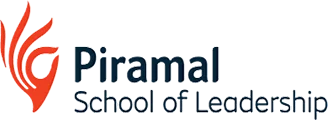'I want to become like my teacher.'
Who among us doesn’t remember the teacher who left a lasting impact? Teachers are often the unsung heroes behind our successes that we look upon as role models. The yearly celebration of Teacher’s Day is recap of this gratitude to all those educators who have build us to what we are today. As we acknowledge their contributions, it is crucial to recognize that empowering educators involves providing them with the support, resources, and respect they need to thrive. This year's observance underscores the necessity of strengthening our teachers, who are instrumental in building the backbone of our society.
Global Connection: Role of teachers is crucial for SDGs
The interwoven relationships between educators, students, and the broader community echo a larger truth—our collective future that is shaped through education.
While education has long been heralded as a crucial catalyst for sustainable development, the potential of education to drive impactful environmental, economic, and societal change is highly unexplored. Sustainable development demands change in education.
Target 7 of the United Nations’ Sustainable Development Goal 4 on Quality Education calls for “all learners to acquire the knowledge and skills needed to promote sustainable development”, including areas like climate and environmental education, global citizenship education, and human rights education.
This change can be supported through a process of engagement designed to give key decision makers and other stakeholders of education systems. It an opportunity to reflect on the knowledge, skills and attitudes required of educators whose task it is to prepare learners, young and old, for a fulfilling, productive and environmentally sustainable life in the twenty- first century.
The SDG India Index by NITI Aayog highlights that although India has made progress in improving the general quality of education, the incorporation of sustainable development education in schools is still below the desired level. The education component in India shows progress, particularly in expected years of schooling. However, teacher empowerment in India remains a challenge due to issues such as inadequate training, limited autonomy, and low salaries. Efforts like the National Education Policy 2020 aim to address these issues, but there is still a noticeable gap when comes to efforts of empowerment of teachers. There is an urgent requirement for capacity-building programs that specifically target the development of teachers' abilities to impart knowledge about sustainable development to pupils.
Challenges and Possibilities
The educational challenges teachers face aresarxz influenced by regional disparities, socioeconomic inequalities, and inconsistent implementation of reforms. The lack of teacher training in sustainable development hinders the delivery of essential competencies like problem-solving, critical thinking, and collaboration.
A SDSN’s Malaysia study involving teachers, school leaders, academics, non-government organisations and Education Ministry representatives, shows that most teachers lack access to capacity-building for education for sustainable development. Teachers who seek these opportunities on their own can find their efforts hampered by school leaders and peers hesitant to undertake any activity that doesn’t contribute to key performance indicators like attendance or standardised test scores.
These challenges are not unique to Malaysia. Around the world, teachers are overburdened with large class sizes, limited resources, insufficient training, outdated structures, and excessive demands on their time.
For Building Bharat, addressing the issues related to teacher empowerment, such as professional development, working conditions, and decision-making authority, it is crucial for India to achieve more balanced and sustainable human development.
Comprehensive systems change — encompassing policy reform, curriculum revision, content development, and teacher training — is necessary to truly deliver holistic education for sustainable development. To help teachers rise above rigid structures and administrative burdens, we need training that will emphasise the role of teachers in shaping their students’ futures, reorienting them to a teacher’s core purpose.
Education systems now need to catch up
Like sustainable development itself, transforming education requires the active participation of every level of society including teachers, parents, school leaders, policymakers, and, of course, students.
By refocusing our approach to education and by equipping stakeholders with appropriate support, we can push education systems to deliver on the commitments made at the Transforming Education Summit and enable society to fulfil the promises of the SDGs.
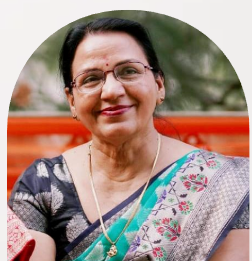
"The Piramal Foundation's teacher capacity-building initiatives, aligned with the National Education Policy (NEP) 2020, have been transformative in reshaping the educational landscape in our district. By equipping teachers with modern pedagogical skills and fostering an environment of continuous learning, these programs have empowered educators to meet the demands of 21st-century education”
Ansuiya Singh _ CDEO Jhunjhunu
Piramal Foundation has developed specific models aimed at enhancing teachers' mindsets and upskilling them to adopt project-based education in their classrooms. These models are designed to shift the traditional teaching approach towards a more dynamic, student- centered methodology, where students learn through real-world projects that foster critical thinking, collaboration, and creativity.
- Growth Mindset Workshops: The foundation conducts workshops focused on developing a growth mindset among teachers. These workshops are designed to encourage teachers to solve challenges, learn from failures, and continually seek improvement in their teaching practices. By fostering a growth mindset, teachers become more open to experimenting with new pedagogies like project-based education.
- Reflective Practice Sessions: Teachers are encouraged to engage in reflective practices where they critically analyse their teaching methods, student engagement levels, and learning outcomes. Through guided reflection, teachers identify areas for improvement and develop strategies to enhance their effectiveness in the classroom. This reflective approach helps in cultivating a mindset that is adaptable and responsive to the needs of the students.
Global communities have been working in several directions to provide a meaningful pathway to develop the 'reflective teachers', a cadre of confident, effective, and efficient teachers for the 21st century's fast-changing globalized society who can teach effectively in diverse classrooms. UNICEF launched the Time to Teach (TTT) research project with the goal of identifying the factors affecting teacher attendance and informing the design and implementation of better teacher policies. Many other organisations like World Bank Group, Education International (EI), The Global Partnership for Education (GPE), The British Council, The Asian Development Bank (ADB), The Brookings Institution are conducting research to provides policy recommendations on teacher development and education reform.
Empowering Educators in India:
Piramal Foundation has been instrumental in integrating Project-Based Learning (PBL) into public school education programs for Building Bharat. Particularly putting focus on schools serving high-poverty or socially marginalized communities, the foundation's PBL initiative has targeted 1500 schools, reaching 4500 classrooms and 4500 teachers in Jhunjhunu district of Rajasthan.
This approach focuses on promoting critical skills such as critical thinking, active citizenship, and problem-solving, which are essential for students to creatively participate in future societies and workplaces.
Furthermore, the foundation has developed models for enhancing teacher mindset and upskilling teachers to adopt project-based education in their classrooms. These efforts aim to transform traditional teaching practices, making education more engaging and relevant for students, especially those from disadvantaged backgrounds.
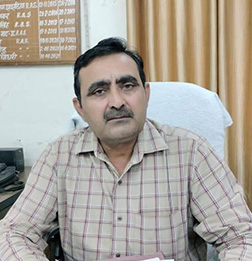
"During my field visit, I witnessed firsthand the positive impact of the Piramal Foundation's efforts to empower district teachers with 21st-century education skills. The results have been truly encouraging. I look forward to the Foundation launching more initiatives in the future to create an even greater impact on a larger scale."
MR. Jawahar Chaudhary_ CEO Jila Parishad
Project-Based Learning (PBL) Modules: Piramal Foundation has developed comprehensive teacher’s manual toolkit- [ PBL Guidebook] that guide teachers to practices and experience the innovative pedagogy. These tool kit equipped teacher to cover essential aspect of learning and designing classroom intervention.
Hands-On Workshops: Teachers participate in hands-on workshops where they collaborate with peers to design and implement project-based learning units. These workshops provide teachers with practical experience in managing projects in the classroom, including how to facilitate student inquiry, manage group dynamics, and ensure that projects are aligned with curriculum standards.
Resource Development and Sharing: The foundation supports teachers in developing and sharing project-based learning resources. This includes creating PBL Booklets, lesson plans, and assessment rubrics By building a repository of resources, teachers are better equipped to integrate PBL into their teaching.
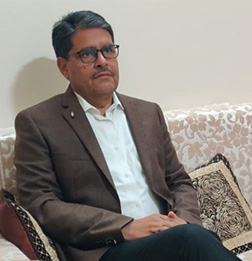
“ 21वीं सदी के स्कूल के लिए शिक्षक शिक्षा में एक आदर्श बदलाव के लिए “रूपांतरण” ( टीचर लर्निंग लैब) कार्यक्रम के माध्यम से ज़िला शिक्षा एवम् प्रशिक्षण संस्थान शिक्षक पेशेवर विकास और शिक्षक शिक्षा के एक अग्रणी माडल के रूप में झुंझुनू को एक मॉडल जिला बनाने की और प्रयासरत है”
अमिलाल मुण्ड, ज़िला शिक्षा अधिकारी एवम् प्राचार्य डाइट
Media coverage
https://janmanasshekhawati.com/news/50526
https://janmanasshekhawati.com/news/51403
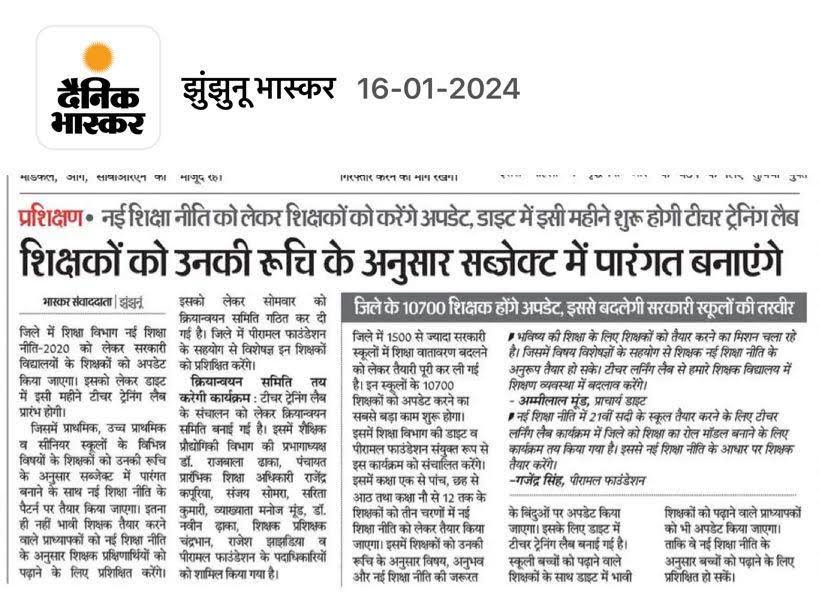


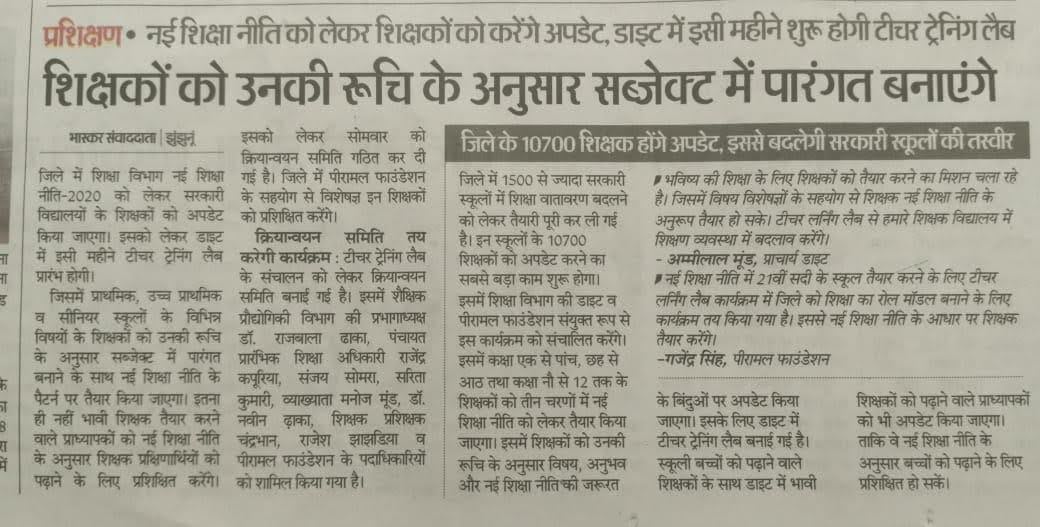
Acknowledgements
I would like to extend my heartfelt thanks to everyone involved in writing this case study blog. Your invaluable support and contributions have made this piece truly insightful. With unwavering guidance and leadership, Geeta Kannupillai has been instrumental in shaping this blog. The meticulous handling of every detail was possible for Noorul Khan, who dedicated his efforts to gathering program data ensuring the accuracy of this piece. Thank you Vandana Nishad for sharing the necessary reports. I am also deeply grateful to Gajendra Singh, whose insightful views have greatly enriched this blog, adding depth and perspective that made it stronger and more impactful. This endeavour would not have been possible without your collective efforts, and I am sincerely appreciative of your commitment and collaboration. Thank you for being an integral part of this journey.
The Path Ahead
World Teachers’ Day 2024 is not just about looking back but also setting the stage for the future. It's an occasion to introspect on our roles in supporting educators. As World Teachers’ Day 2024 concludes, let's carry forward the spirit, ensuring every day is a day of gratitude and learning that will drive us towards Building Bharat.
Sources
https://sdgresources.relx.com/events/world-teachers%E2%80%99-day-2024
https://360info.org/why-empowering-teachers-is-key-to-a-sustainable-future/
TAGS
SHARE




